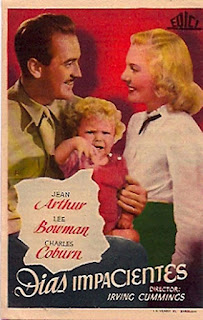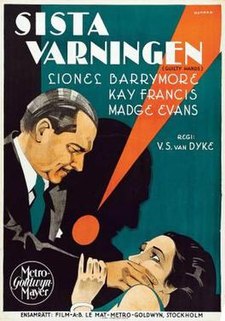Give Me Your Heart (1936) begins with a parting -
Belinda Warren (Kay Francis) and Robert Melford (Patric Knowles) have
been having an affair, and it is about to end. He is married; his wife
Rosamund (Frieda Inescort) is an invalid, but he still loves her and
cannot leave her. So Belinda and he part; she finds herself alone upon
the death of her father - until she has the son that she and Robert
conceived. Belinda is approached by Robert's father, Lord Farrington,
who asks if he may raise the child as his son's heir. The boy will be
loved and happy, and will want for nothing. Reluctantly, Belinda
agrees; finally fleeing to the U.S., where she meets Jim Baker (George
Brent). They marry, but Jim cannot understand why his wife is always
unhappy.
This is a soaper, certainly, but it's a lovely film with some great supporting performances. Henry Stephenson is wonderful as Lord Farrington. He really is the person you would be willing to give your child to. His affection for Belinda is apparent, and we realize that this feeling is mutual. Also great is Roland Young as "Tubby", Belinda's dear friend, and friend to Lord Farringon. "Tubby" functions almost as a Deus ex Machina, descending on Belinda's life to help make the changes that will make things better. Young plays him with humor, but with a serious concern for this woman who is obviously in so much pain. And Frieda Inescort has one excellent scene towards the end of the film.
Since I'm a fan of women doctors in the movies, it was fun to see that Belinda's doctor is a woman - Dr. Florence Cudahy played by Helen Flint. A good friend to Belinda, she is also a good doctor, refusing to give the insomniac Belinda sleeping pills. Florence prefers instead to try to find the root of Belinda's pain.
As always, any Kay Francis is a pleasure. However, next time we'll be visiting another 30s actress. In the meantime, here's a trailer from this film:
This is a soaper, certainly, but it's a lovely film with some great supporting performances. Henry Stephenson is wonderful as Lord Farrington. He really is the person you would be willing to give your child to. His affection for Belinda is apparent, and we realize that this feeling is mutual. Also great is Roland Young as "Tubby", Belinda's dear friend, and friend to Lord Farringon. "Tubby" functions almost as a Deus ex Machina, descending on Belinda's life to help make the changes that will make things better. Young plays him with humor, but with a serious concern for this woman who is obviously in so much pain. And Frieda Inescort has one excellent scene towards the end of the film.
Since I'm a fan of women doctors in the movies, it was fun to see that Belinda's doctor is a woman - Dr. Florence Cudahy played by Helen Flint. A good friend to Belinda, she is also a good doctor, refusing to give the insomniac Belinda sleeping pills. Florence prefers instead to try to find the root of Belinda's pain.
As always, any Kay Francis is a pleasure. However, next time we'll be visiting another 30s actress. In the meantime, here's a trailer from this film:









































